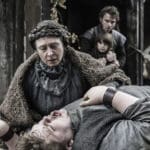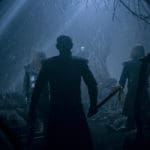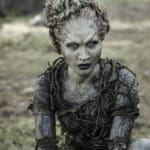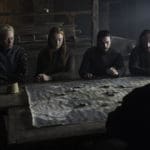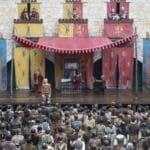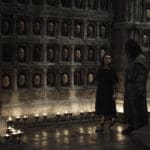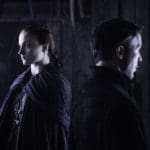
THE DOOR Plot SUMMARY:
Sansa confronts Littlefinger and takes command in planning the attack on Ramsay’s forces at Winterfell. In Braavos, Arya attends a play and is given a new task and another chance to make good with the Many-Faced God. The Ironborn drown and crown Euron in the Kingsmoot and Yara and Theon take to the seas. Jorah finally wins his way back into Daenerys’ good graces and, after confessing both his love and his advancing greyscale, sets out on a new mission. In Meereen, Tyrion and Varys enlist the help of another red priestess in winning the people’s support of Daenerys’ regime. Beyond the Wall, Bran gets a glimpse of the origins of both the White Walkers and ultimately Hodor after an unsanctioned vision helps lead the Night’s King and his army of the dead right to their door.

Despite its stunning, season ending cliffhanger, Game of Thrones’ fifth season was too often weighed down by pacing issues and sometimes sagged under the weight of George R.R. Martin’s ever-growing and increasingly tangled universe. As Jon’s blood spread across the snowy ground in last season’s closing moments, the show had finally caught up to Martin’s copious pages and critics and fans alike were left wondering about more than just Snow’s fate – namely, just where would this new narrative liberty for Benioff and Weiss (armed with an outline of Martin’s endgame, but no new written source material) lead? Thankfully, judging by the first half of this current season, GoT has risen to the challenge, delivering a crop of strong, tightly-paced, and explosively entertaining episodes, and none better than this week’s haunting and potentially game-changing, “The Door.”
Like many of the series’ better episodes, “The Door” maintains a tight, in-depth focus on a handful of characters (particularly the Stark children), rather than rushing around Westeros in a perfunctory attempt to touch all the bases (Kings Landing and – thankfully – Dorne are both omitted entirely this week). One benefit of a more streamlined approach is that it allows Benioff and Weiss to flesh out some subtle, yet powerful character development, as is the case this week with Sansa (Sophie Turner), who continues in her maturation from pretty, passive princess to steely and savvy shot-caller. While Sansa seemed perched on the cusp of finally grasping agency while under Littlefinger’s (Aiden Gillen) tutelage back in season four, his marrying her off to Ramsay led to some much-maligned narrative regression last season, consigning her once again to the role of helpless victim, though this time at the hands of someone far worse than Joffrey. These days, Sansa’s timidity is clearly a thing of the past as she forces Littlefinger to acknowledge what had been done to her and openly questions his always mysterious motives and the role he played in her abuse. “If you didn’t know,” she glowers, “You’re an idiot. If you did know, you’re my enemy.” Either way, he’s no longer of any use to her and her barely concealed rage and threats to unleash Brienne (the always wonderfully loyal and imposing Gwendoline Christie) completely flip the power dynamic between her and her former mentor.

Despite her dismissal of Littlefinger, it’s clear that Sansa has taken some of his teachings to heart, as she chooses to act on his tip of the regrouped Tully army in Riverrun when helping plan the attack on Ramsay’s forces, but lies to Jon, Davos, and co. about where she garnered that intel. Clearly, she is no longer the naïve, trusting little girl who once informed Cersei of her father’s plans to flee King’s Landing, but is now a young woman who has learned from the best liars in Westeros that no one is to be fully trusted and that it’s usually wiser to make moves with secrets than with vulnerable sincerity.
Similarly, “The Door” spends a significant amount of character-building time with Arya (Maisie Williams), who is finally moving beyond the sparring-with-broomsticks stage of her training in Braavos. Arya no longer slips up when called upon to recite the “I am no one” mantra, but has she truly let go of her ego or is she merely parroting back the words she knows Jaqen (Tom Wlaschiha) and the Waif (Faye Marsay) want to hear? The task Jaqen eventually ascribes to her is cleverly designed to answer that question, as Arya is assigned the murder of an actress in Braavos’ theatre company. In order to case her victim, she attends the company’s play, a broadly comic retelling of recent Westeros’ political history (that so much screen-time was dedicated to the play-within-the-play felt a bit Shakespearean and it’s quite possible Jaqen intended it to serve as a Hamlet-esque “Mousetrap” for Arya). At first, Arya blends easily with the faces in the crowd, laughing along at the over-the-top, scene-chewing performances (say what you will about Braavos’ actors, but their wardrobe and make-up team are top-notch), but when a buffoonish Ned Stark appears on stage, followed by his dopey, melodramatic daughter, Sansa, Arya’s smile turns to a scowl, belying her “a girl is no one” shtick.

Afterwards, Arya heads backstage and observes her target, the woman who plays Cersei. She astutely surmises that the younger actress playing Sansa ordered the hit out of jealousy and when she later remarks to Jaqen that her intended victim seems like a decent person, he asks, “Does death only come for the wicked and leave the decent behind?” By tasking Arya with the actress’ murder, he’s casting her in the role she’s longed to play – that of Cersei Lannister’s murderer. Yet in this particular case, “Cersei” is a decent woman and her killing is ordered by the wicked, jealous “Sansa.” This theatrical role reversal and the behind-the-scenes part Arya is to play speaks to the real lesson Arya needs to learn at the House of the Black and White, namely that nothing is ever black and white. There are no clear lines between good and evil, heroes and villains, and all of us – kings and paupers alike – navigate the world in shades of gray.
Those blurred lines are nowhere more evident this week than in Bran Stark’s (Isaac Hempstead Wright) absolute game-changer of a storyline. Last seen a few weeks back, teasing us about what really happened in the Tower of Joy, Bran’s ongoing training with the Three-Eyed Raven (Max von Sydow) finally yields some truly illuminating insight, as we learn via vision of the past that Leaf (Octavia Alexandru) and the Children of the Forest were responsible for creating the White Walkers, driving an icy blade into the chest of one of the First Men and giving rise to the Night’s King. Leaf explains that the Children of the Forest were simply doing what was needed to be done for their survival – an act with basically pure intent that nonetheless wrought horror and evil upon the world. The ever-growing legion of the dead whom flank the White Walkers serve as a testament of the fact that, in the world of GoT, the typically short-sighted self-preservation of the game’s major players often leads to a ton of collateral damage and the suffering of the common folk.
That point is hammered home on a profoundly human level with the reveal of the origin and simultaneous fate of poor, poor Hodor. After the impatient Bran ventures into an unsanctioned vision (this time taking him into the near-future, rather than the past), the Night’s King appears and breaches the vision, making physical contact with Bran and thus breaching the safety of and gaining admittance to his previously-impervious hiding spot. Soon, all hell breaks loose in an epic battle set-piece that recalls the horrors of last season’s “Hardhome.” The dead swarm the cave and the impervious White Walkers march right through the fray, aiming for the Three-Eyed Raven, Bran, Meera (Ellie Kendrick), and Hodor (Kristian Nairn), while the wights easily dispatch of poor Summer (I am SO surprised by the recent spate of direwolf deaths! I always assumed that they served as avatars for the Stark kids and that their well-being was indicative of that of their Stark child counterparts, but now I’m not so sure). While Leaf and Meera (who, most impressively, shatters a White Walker ala Jon Snow at Hardhome) fend off the horde, Bran is incapacitated, lost in a vision of Winterfell of yore with the Three-Eyed Raven, whom is desperately attempting to quickly upload his vast knowledge into Bran.

While mired in that vision of the past, Bran hears the echoes of Meera’s present day cries, urging him to warg into Hodor. The Three-Eyed Raven urges him to listen to his friend and so he does, for survival. Present-day Hodor springs to action, carrying Bran away from the swarming masses of the dead, aided by Meera and also Leaf’s ultimate self-sacrifice. As Meera escapes, dragging Bran’s still lifelessly-rapt body into the wintery wilderness, she yells to Hodor to “Hold the door.” Back in Winterfell of yore, Bran – living both moments simultaneously – bears witness to Wylis, the gentle giant of a stable boy’s ultimate undoing. Wylis collapses in a seizure on the courtyard. “Hold the door” becomes “Hodor.” And another innocent becomes an unwitting casualty of a well-intended quest for survival.
While Wylis / Hodor is neither the first nor last innocent victim in the wars waged so far or in the great war to come, his death is perhaps the most hauntingly tragic we’ve seen to this point, precisely because his life was irrevocably altered by it, through means he couldn’t possibly comprehend, many years before it even occurred. Hodor’s life was defined by an encroaching horror he couldn’t grasp and, in a way, so is Bran’s, as the correlating collapse of the entire time line of Game of Thrones now poses the questions – “What have I seen? What have I done? What does it mean?”
Rating: 9 out of 10


